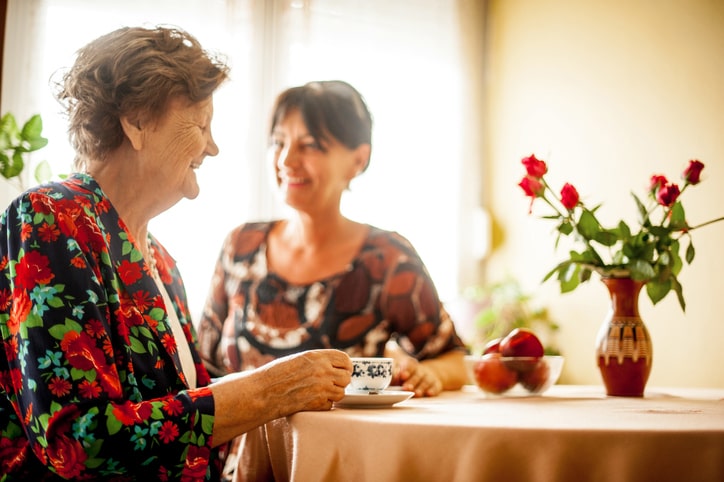
Seeing an older loved one after a long time apart can bring lots of joy, but it can also bring some unpleasant surprises. You might notice they’re having more trouble caring for themselves. Perhaps the house isn’t as tidy as usual, or you notice that clothes haven’t been cleaned or changed in a while. Maybe the refrigerator and cupboards are close to empty or the bills have piled up.
Here are some things to look for that might indicate your loved one might need more assistance and some ways you can help:
Changes in your loved one’s behavior or mental alertness may be a sign of depression, dementia, or a declining health condition. Are they reacting inappropriately? Are they able to hold a conversation? Ask about their driving—have they gotten lost on the road?
If you’re worried, schedule an appointment with their doctor or doctors and plan to go with them.
Check around the floors for loose rugs —and get rid of them.
Check around for exposed electrical cords and tuck them away.
If falling has become a problem or you are worried it might, suggest to your loved one that they get a medical alert device they can wear to alert 911 if they fall. Some personal emergency response systems work outside of the home, too.
AgeWays also offers A Matter of Balance classes to help older adults prevent falls, feel more confident and stay active.
It’s easy to fall behind on bills, so it’s a good idea to make sure your loved one is up to date on payments. You might ask to review a bank statement—and take note of checks written to people or organizations you don’t know.
You might also want to check credit card statements for odd purchases.
If your loved one has an email account, you might ask permission to check for any alerts connected to a payment coming due or overdue.
If you are concerned about their spending, consider securing power of attorney at some point. It will enable you to legally make decisions when your loved one can’t.
If your loved one doesn’t have enough food in the home or has lost weight, ask them how they’re getting meals. If they don’t get home-delivered meals at home, you may want to sign them up for Meals on Wheels. Volunteers will deliver one or two meals each day.
If your loved one doesn’t want home-delivered meals, consider signing up for Shipt or Instacart, which will deliver groceries to their doorstep. Some stores offer their own delivery service.
If your loved one’s place needs to be cleaned, hire a service to come in.
If your loved one needs help mowing, shoveling or raking, call your county or city to ask if they have services. If you live in Macomb County, you may call the Office of Senior Services to ask about the availability of these outdoor services. The Council on Aging, inc., Serving St. Clair County also offers chore services.
The Interfaith Volunteer Caregiver Program may also be able to help people who live in Macomb, and if they have volunteers in those areas, parts of Oakland and St. Clair counties. Call (586) 757-5551.
Check to make sure medications are organized, up to date, and are being taken as directed.
If it appears your loved one hasn’t been taking the medications, try setting reminders on their smartphone or buying a pill organizer. You can also pay for a service that will alert them when it’s time to take their medication.
If there’s an attentive neighbor or friend who is willing, ask them to come by or call to remind your loved one to take their medication.
If you feel your loved one should not be living by themselves, explore options for what it would take for them to stay safely at home.